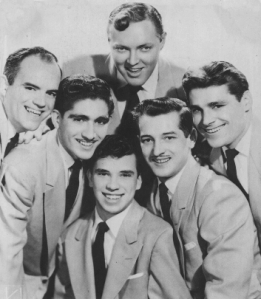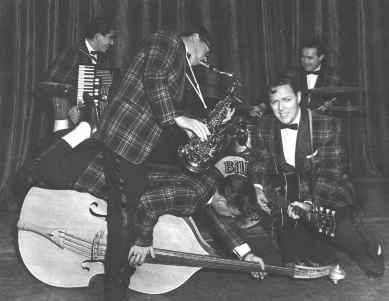| BILL
HALEY
THE COMETS
IN MEXICO
IN SWEDEN
THE MOVIES
CD's
LYRICS
VIDEO
LINKS
WEBMASTER
HOME
|
 'You women have heard
of jalopies, you've heard the noise they make', so began the song that
was to break the mould and create a piece of musical
history. 'Rocket
88'
originally recorded by the black group Jackie Brenston
and his Deltacats. The year was 1951 and this was the
first time a white country singer had covered a hard
rhythm and blues tune. Danny Cedrone supplemented Billy
Williamson's guitar playing on this release and Haley
delivered the song in a low, forceful vocal complemented
by Al Rex's heavy slap bass. 'You women have heard
of jalopies, you've heard the noise they make', so began the song that
was to break the mould and create a piece of musical
history. 'Rocket
88'
originally recorded by the black group Jackie Brenston
and his Deltacats. The year was 1951 and this was the
first time a white country singer had covered a hard
rhythm and blues tune. Danny Cedrone supplemented Billy
Williamson's guitar playing on this release and Haley
delivered the song in a low, forceful vocal complemented
by Al Rex's heavy slap bass. In 1952 the band cut 'Rock The Joint'
with sales topping 75,000. In early 1953 Bill began
further developing his formula for what was ultimately to
become rock and roll. He added drums to the line up,
initially hiring young drummer Charlie Higler. He was
replaced in the Summer of 1953 by Dick Richards. The
transformation from Western swing band was almost
complete. Only one last ingredient remained to be added
in the form of sax player Joey D'ambrosio. Whilst 'Rock The Joint' had been a modest hit, their next release
was to give them their first taste of stardom. 'Crazy, Man, Crazy', written by Haley and Marshall Lytle
sitting at Bill's kitchen table. The lyric was
purportedly based on a phrase Bill picked up while
performing on one of his numerous high school shows.
On a personal level the pressures
of touring began to take their toll on his marriage
ultimately leading to his divorce from Dorothy. He was
shortly afterwards to marry a pretty young blonde girl,
Barbara Joan Cupchack (Cuppy).
'Crazy, Man, Crazy' shot into the U.S. Top 20 and gained Haley
national success. Newspapers ran stories which gave the
impression that Bill's story was one of overnight
success, conveniently forgetting it was the culmination
of many years hard work.
we're
gonna Rock . . .
April 12th
1954, Pythian Temple
Studio, West 80th Street, New York City. The song that
introduced rock & roll to the unsuspecting public was
recorded in a converted ballroom, the high vaulted
ceilings adding to the dynamics of the recording.
The
Comets - Danny Cedrone,
Billy Williamson, Johnny Grande, Joey D'Ambrosio (tenor
sax), Marshall Lytle (bass) and Billy Gussack (drums)*,
stood on a stage, some four feet above Haley. He
stood, facing the stage, on the beautiful wooden dance
floor, close to the microphone, about eight feet from his
musicians.
*at the insistance
of Gabler the Comets regular drummer, Dick Richards was
replaced by Gussack at the session
1,2, 3
o'clock
Milt Gabler, sat in the control room, urging the
engineers to crank up the levels, as the meters bounced
up into the red.
Gabler was an experienced producer,
having previously recorded The Inkspots, Louis Jordan and
Ella Fitzgerald. He was to remain in control of Bill's
recording dates for the next 5 years.
The second song recorded at that
historic session was an unusual novelty tune, 'Thirteen
Women'. The premise of the story being an explosion
of an 'H' Bomb, leaving only one man and thirteen women
alive!
And that was it. Just two titles.
Decca presumably testing the market for this new style of
music before committing themselves any further.
They were not to be
disappointed. With initial sales topping 75,000 the band
were signed to the label and the next session planned for
June 7th. Although 'Clock' was a modest hit, it wasn't
until the song was used as the title track on the movie
'The Blackboard Jungle' some 12 months later, that it
became the first anthem of Rock & Roll. Estimates
state that Haley was eventually to sell over 25 million
copies of the record.
Shake,
Rattle & Roll . . .
The follow up to 'Clock' was the r&b song 'Shake, Rattle &
Roll'. The song
had originally been a hit for Joe Turner. But while
Turner's version has a blues feel to it Haley's version
is most definitely rock & roll. It was the first rock
& roll record to sell a million copies. His next
release 'Dim,
Dim The Lights' broke
into the r&b charts. More exciting songs of this new
genre followed - 'Birth Of The Boogie' with its' thumping jungle beat - 'Razzle Dazzle', an out and out dance tune and 'Two Hound Dogs', called rhythm and Blues!
.
. .Then late in 1955,
just as the band had established themselves as major
stars, Joey d'Ambrosio, Dick Richards and Marshall Lytle
left the Comets. They formed the Jodimars (a name derived
from their respective names, JOey, DIck & MARShall).
Capitol records immediately signed them, but
unfortunately success eluded them. However they did
produce a number of superb original rock & roll tunes
such as 'Well
Now Dig This', 'Lets All Rock
Together' and 'Rattle Shakin' Daddy'. All of them with the unmistakable
'Comets' sound.
The next stage in the development of the Comets was
crucial. Bill needed musicians in a hurry to fulfil his
live bookings. Al Rex rejoined to play bass. Frank
Beecher who had featured on the bands recent recordings
played lead guitar. Finally they were joined by one of
the most enduring members of the Comets, Rudy Pompilli on
tenor saxophone. This was the classic Comets line-up. In
the coming years audiences throughout the world would
marvel at the antics of Rudy and Al. Rudy belting
out his sax solos, arching his back until he was
virtually lying flat on the floor. And Al throwing his
bass up into the air, then jumping onto its' side while
still playing. This was truly the very first integrated
rock & roll band. Bill was more than happy to share
the spotlight with his very talented musicians. Rudy's
show stopping solo, 'Rudy's Rock' and Frank Beecher's 'Guitar Boogie' being examples in point. And then with the
audience at fever pitch, Bill would come out and finish
the set with 'Rock
Around The Clock'
 R - O - C - K R - O - C - K
'Haley
Came Along With The Rockin' Song'
Back in the studio this new group set to work and
consolidated its' position by making further excellent
records. 'R.O.C.K.' was the first of these, charting in song
the birth of rock & roll. The flip side of this
record was Haley's own composition 'Rock-A-Beatin'
Boogie', a small hit
for the Treniers a few years before. The 'Saints Rock &
Roll' gave each member
of the band the chance to perform a small solo. At the
finish the song rises to a wonderful crescendo reprising
the final instrumental chorus of 'Rock Around The
Clock'.
The next really big hit came with 'See You
Later Alligator'. A
version had already been released by Bobby Charles on the
Chess label. Gabler needed to get Bill into the studio
quickly to record it. This was the only song the band cut
at the main Decca studios, and they literally had to
break into the place on a Sunday to cut the record.
Gabler having forgotten the keys to his office.
After A While Crocodile
 
|
 'You women have heard
of jalopies, you've heard the noise they make', so began the song that
was to break the mould and create a piece of musical
history. 'Rocket
88'
originally recorded by the black group Jackie Brenston
and his Deltacats. The year was 1951 and this was the
first time a white country singer had covered a hard
rhythm and blues tune. Danny Cedrone supplemented Billy
Williamson's guitar playing on this release and Haley
delivered the song in a low, forceful vocal complemented
by Al Rex's heavy slap bass.
'You women have heard
of jalopies, you've heard the noise they make', so began the song that
was to break the mould and create a piece of musical
history. 'Rocket
88'
originally recorded by the black group Jackie Brenston
and his Deltacats. The year was 1951 and this was the
first time a white country singer had covered a hard
rhythm and blues tune. Danny Cedrone supplemented Billy
Williamson's guitar playing on this release and Haley
delivered the song in a low, forceful vocal complemented
by Al Rex's heavy slap bass.  R - O - C - K
R - O - C - K